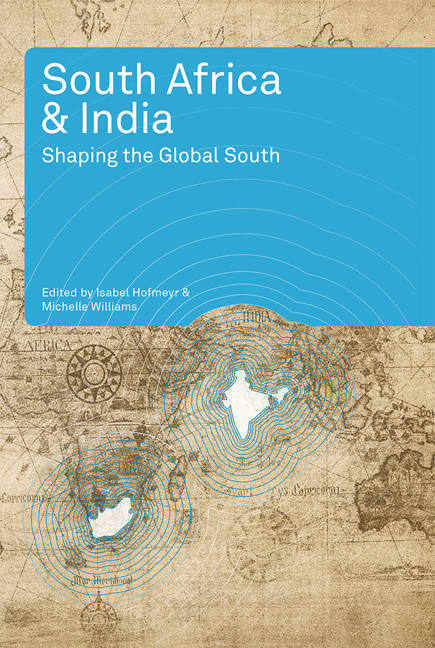Book contents
- Frontmatter
- Contents
- Acknowledgements
- Abbreviations and Acronyms
- Introduction
- Historical Connections
- Socio-political Comparisons
- Chapter 6 Renaissances, African and Modern: Gandhi as a Resource?
- Chapter 7 Democratic Deepening in India and South Africa
- Chapter 8 Local Democracy in Indian and South African Cities: A Comparative Literature Review
- Chapter 9 Reimagining Socialist Futures in South Africa and Kerala, India
- Chapter 10 Labour, Migrancy and Urbanisation in South Africa and India, 1900–60
- Conclusion
- Notes and References
- About the Authors
- Index
Chapter 6 - Renaissances, African and Modern: Gandhi as a Resource?
from Socio-political Comparisons
Published online by Cambridge University Press: 21 April 2018
- Frontmatter
- Contents
- Acknowledgements
- Abbreviations and Acronyms
- Introduction
- Historical Connections
- Socio-political Comparisons
- Chapter 6 Renaissances, African and Modern: Gandhi as a Resource?
- Chapter 7 Democratic Deepening in India and South Africa
- Chapter 8 Local Democracy in Indian and South African Cities: A Comparative Literature Review
- Chapter 9 Reimagining Socialist Futures in South Africa and Kerala, India
- Chapter 10 Labour, Migrancy and Urbanisation in South Africa and India, 1900–60
- Conclusion
- Notes and References
- About the Authors
- Index
Summary
Introduction
At the close of his India: A Million Mutinies Now, V. S. Naipaul (1998:517) says:
What I hadn't understood in 1962, or had taken too much for granted, was the extent to which the country had been remade; and even the extent to which India had been restored to itself, after its own equivalent of the Dark Ages – after the Muslim invasions and the detailed, repeated vandalising of the North, the shifting empires, the wars, the 18th-century anarchy.
There is, of course, a certain irony in using Naipaul as a point of departure for this chapter on Gandhi and his significance for thinking about the African Renaissance. His positioning of Islam, as the opening quote suggests, as an un-Indian phenomenon is problematic. His reflections on Africa are perhaps even more so. His Africa, as opposed to his India, is signified by a profound, almost primordial, loss of meaning – ‘nothing has any meaning’, his main character, Salim, says at the close of A Bend in the River (Naipaul, 1980:281). Earlier, Salim describes the people in the prison in which he finds himself:
Those faces of Africa … I felt I had never seen them so clearly before. Indifferent to notice, indifferent to compassion or contempt, those faces were yet not vacant or passive or resigned …. They had prepared themselves for death not because they were martyrs; because what they were and what they knew they were was all they had (Naipaul, 1980:278).
In this reading of his fellow human beings there is nothing to redeem. But Naipaul, like Gandhi, and particularly those elements of Gandhi's approach to the question of racial discrimination in South Africa that appeared to seek for Indians a favoured position above Africans, is more than the sum of his parts. Naipaul's interest for this chapter lies in the powerful ways he presents India as a remade space, as a space that has been restored to itself. Significantly, he talks not of an actual restoration; it is not ancient India of which he speaks.
- Type
- Chapter
- Information
- South Africa and IndiaShaping the Global South, pp. 126 - 149Publisher: Wits University PressPrint publication year: 2011



